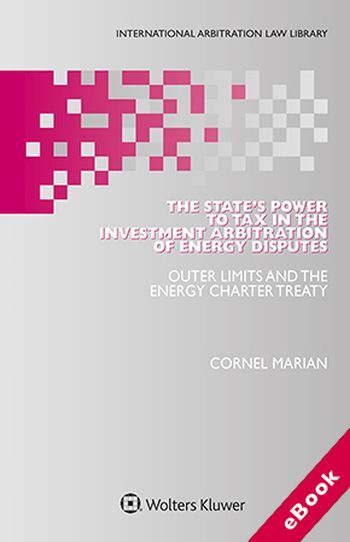
The device(s) you use to access the eBook content must be authorized with an Adobe ID before you download the product otherwise it will fail to register correctly.
For further information see https://www.wildy.com/ebook-formats
Once the order is confirmed an automated e-mail will be sent to you to allow you to download the eBook.
All eBooks are supplied firm sale and cannot be returned. If you believe there is a fault with your eBook then contact us on ebooks@wildy.com and we will help in resolving the issue. This does not affect your statutory rights.
The State’s Power to Tax in the Investment Arbitration of Energy Disputes reviews and maps out existing case law pertaining to the treatment of tax measures in the context of energy disputes providing the first in-depth exploration of the intersection between the treaty investment protection regime and taxation measures. States today are expected not only to regulate the efficient and safe production and distribution of energy to end-users but also to incentivize increased production of energy and the transition to clean energy. In recent years, states are increasingly relying on taxation measures to address the economic challenges affecting the energy sector.
What’s in this book:
With the analysis of all known and pending cases under the Energy Charter Treaty (ECT), as well as non-ECT cases and bilateral investment treaties which have heavily influenced ECT jurisprudence, the author develops a deeply informed energy tax policy that greatly mitigates the points of tension in the current regime. He closely investigates the following elements of the subject:
In a clear and concise manner, the author reviews the rising number of tax-related investment arbitrations emerging not only from the ECT but also from the investment protection instruments that carry an impact on the energy sector providing the necessary framework to dissect any taxation chapter of an investment treaty.
How this will help you:
The book takes a giant step toward meeting the ECT’s mandate to promote long-term cooperation in the energy field with a set of defined objectives focusing on trade, cooperation, energy efficiency, and environmental protection. It will be of immeasurable value to states in developing new initiatives for the future so as to offer a useful instrument for states in drawing their taxation policy and investment incentives. Practitioners and academics with a focus on international arbitration will benefit from the book’s systematic approach that offers a rich inventory of existing and new questions that arise from the need for investment funds and the complex taxation provisions of investment protection treaties.